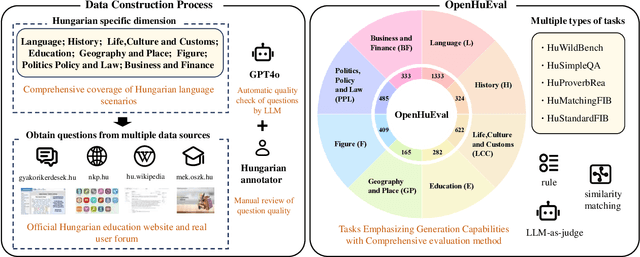Yinfan Wang
GTR-CoT: Graph Traversal as Visual Chain of Thought for Molecular Structure Recognition
Jun 09, 2025



Abstract:Optical Chemical Structure Recognition (OCSR) is crucial for digitizing chemical knowledge by converting molecular images into machine-readable formats. While recent vision-language models (VLMs) have shown potential in this task, their image-captioning approach often struggles with complex molecular structures and inconsistent annotations. To overcome these challenges, we introduce GTR-Mol-VLM, a novel framework featuring two key innovations: (1) the \textit{Graph Traversal as Visual Chain of Thought} mechanism that emulates human reasoning by incrementally parsing molecular graphs through sequential atom-bond predictions, and (2) the data-centric principle of \textit{Faithfully Recognize What You've Seen}, which addresses the mismatch between abbreviated structures in images and their expanded annotations. To support model development, we constructed GTR-CoT-1.3M, a large-scale instruction-tuning dataset with meticulously corrected annotations, and introduced MolRec-Bench, the first benchmark designed for a fine-grained evaluation of graph-parsing accuracy in OCSR. Comprehensive experiments demonstrate that GTR-Mol-VLM achieves superior results compared to specialist models, chemistry-domain VLMs, and commercial general-purpose VLMs. Notably, in scenarios involving molecular images with functional group abbreviations, GTR-Mol-VLM outperforms the second-best baseline by approximately 14 percentage points, both in SMILES-based and graph-based metrics. We hope that this work will drive OCSR technology to more effectively meet real-world needs, thereby advancing the fields of cheminformatics and AI for Science. We will release GTR-CoT at https://github.com/opendatalab/GTR-CoT.
Evaluating Large Language Model with Knowledge Oriented Language Specific Simple Question Answering
May 22, 2025



Abstract:We introduce KoLasSimpleQA, the first benchmark evaluating the multilingual factual ability of Large Language Models (LLMs). Inspired by existing research, we created the question set with features such as single knowledge point coverage, absolute objectivity, unique answers, and temporal stability. These questions enable efficient evaluation using the LLM-as-judge paradigm, testing both the LLMs' factual memory and self-awareness ("know what they don't know"). KoLasSimpleQA expands existing research in two key dimensions: (1) Breadth (Multilingual Coverage): It includes 9 languages, supporting global applicability evaluation. (2) Depth (Dual Domain Design): It covers both the general domain (global facts) and the language-specific domain (such as history, culture, and regional traditions) for a comprehensive assessment of multilingual capabilities. We evaluated mainstream LLMs, including traditional LLM and emerging Large Reasoning Models. Results show significant performance differences between the two domains, particularly in performance metrics, ranking, calibration, and robustness. This highlights the need for targeted evaluation and optimization in multilingual contexts. We hope KoLasSimpleQA will help the research community better identify LLM capability boundaries in multilingual contexts and provide guidance for model optimization. We will release KoLasSimpleQA at https://github.com/opendatalab/KoLasSimpleQA .
Meta-rater: A Multi-dimensional Data Selection Method for Pre-training Language Models
Apr 19, 2025Abstract:The composition of pre-training datasets for large language models (LLMs) remains largely undisclosed, hindering transparency and efforts to optimize data quality, a critical driver of model performance. Current data selection methods, such as natural language quality assessments, diversity-based filters, and classifier-based approaches, are limited by single-dimensional evaluation or redundancy-focused strategies. To address these gaps, we propose PRRC to evaluate data quality across Professionalism, Readability, Reasoning, and Cleanliness. We further introduce Meta-rater, a multi-dimensional data selection method that integrates these dimensions with existing quality metrics through learned optimal weightings. Meta-rater employs proxy models to train a regression model that predicts validation loss, enabling the identification of optimal combinations of quality scores. Experiments demonstrate that Meta-rater doubles convergence speed for 1.3B parameter models and improves downstream task performance by 3.23, with scalable benefits observed in 3.3B models trained on 100B tokens. Additionally, we release the annotated SlimPajama-627B dataset, labeled across 25 quality metrics (including PRRC), to advance research in data-centric LLM development. Our work establishes that holistic, multi-dimensional quality integration significantly outperforms conventional single-dimension approaches, offering a scalable paradigm for enhancing pre-training efficiency and model capability.
OpenHuEval: Evaluating Large Language Model on Hungarian Specifics
Mar 27, 2025



Abstract:We introduce OpenHuEval, the first benchmark for LLMs focusing on the Hungarian language and specifics. OpenHuEval is constructed from a vast collection of Hungarian-specific materials sourced from multiple origins. In the construction, we incorporated the latest design principles for evaluating LLMs, such as using real user queries from the internet, emphasizing the assessment of LLMs' generative capabilities, and employing LLM-as-judge to enhance the multidimensionality and accuracy of evaluations. Ultimately, OpenHuEval encompasses eight Hungarian-specific dimensions, featuring five tasks and 3953 questions. Consequently, OpenHuEval provides the comprehensive, in-depth, and scientifically accurate assessment of LLM performance in the context of the Hungarian language and its specifics. We evaluated current mainstream LLMs, including both traditional LLMs and recently developed Large Reasoning Models. The results demonstrate the significant necessity for evaluation and model optimization tailored to the Hungarian language and specifics. We also established the framework for analyzing the thinking processes of LRMs with OpenHuEval, revealing intrinsic patterns and mechanisms of these models in non-English languages, with Hungarian serving as a representative example. We will release OpenHuEval at https://github.com/opendatalab/OpenHuEval .
 Add to Chrome
Add to Chrome Add to Firefox
Add to Firefox Add to Edge
Add to Edge